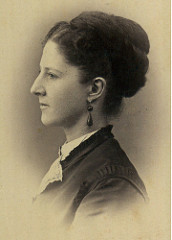January, ‘62.
To-day we are going out to look up some nurses for Will Winthrop’s regiment, and then to the Senate. I forgot to tell you a pretty story we heard the other day from Mrs. Gibbons, our Quaker lady friend. She is a very sweet, kind old lady, and she and her daughter have been out at Fall’s Church getting the hospital there into working order, and showing them how to nurse and cook for the sick, and, thanks to them, one poor fellow who was dying was nursed back into the right road and is now nearly well enough to go home with his father, who, meantime, had been sent for. He, a plain well-to-do farmer from Western New York, was so overcome with gratitude to Mrs. G. and her daughter, that he entreated the young girl to go home with him and be his daughter! “He would do all in the world for her and she should be an equal sharer with his son in the farm of 300 acres,” and it was said (Mrs. Gibbons told us) in the most delicate, genuine way, without any allusion to the young Lieutenant and probably without the least idea of “making a match.” Of course the young girl declined, and then he went to the mother to ask if she hadn’t other daughters like herself for whom he could do something to show his gratitude. Isn’t it like some old ballad? . . .
The management of the jail was before the Senate yesterday and we heard the discussion, and left just before the bill was passed, requiring the release of all persons not committed for crime, which means, principally, the contrabands. Mr. Grimes, the chairman of the Committee on District affairs, abused Marshal Lamon roundly for his bad management and his insolent exclusion of congressmen from one of the institutions which it is their duty to supervise. Georgeanna sent Senator Dixon a note asking if, while the subject is before Congress, something can’t be done about separating children committed for petty crimes, from hardened criminals. . . . There ought to be a reformatory school attached to every jail.
